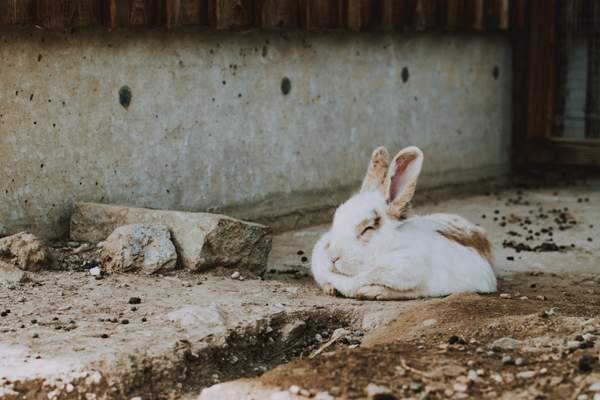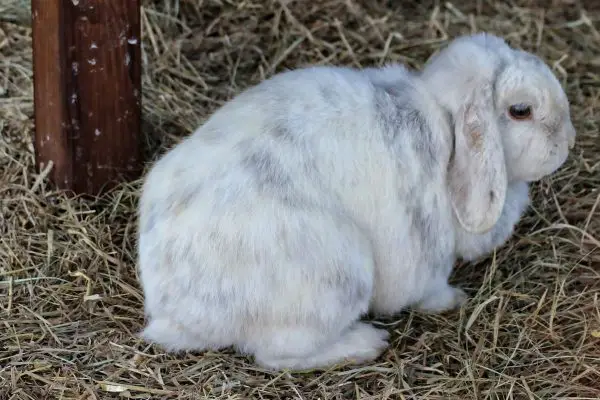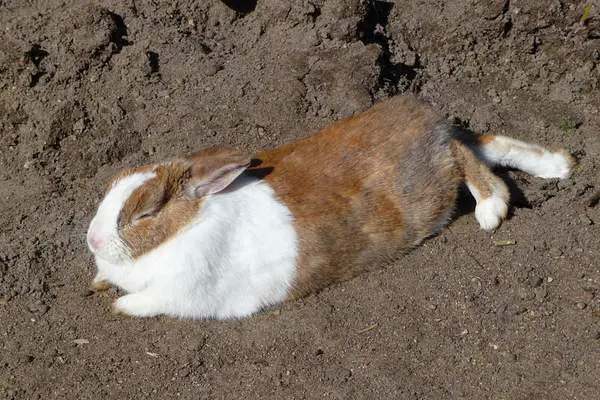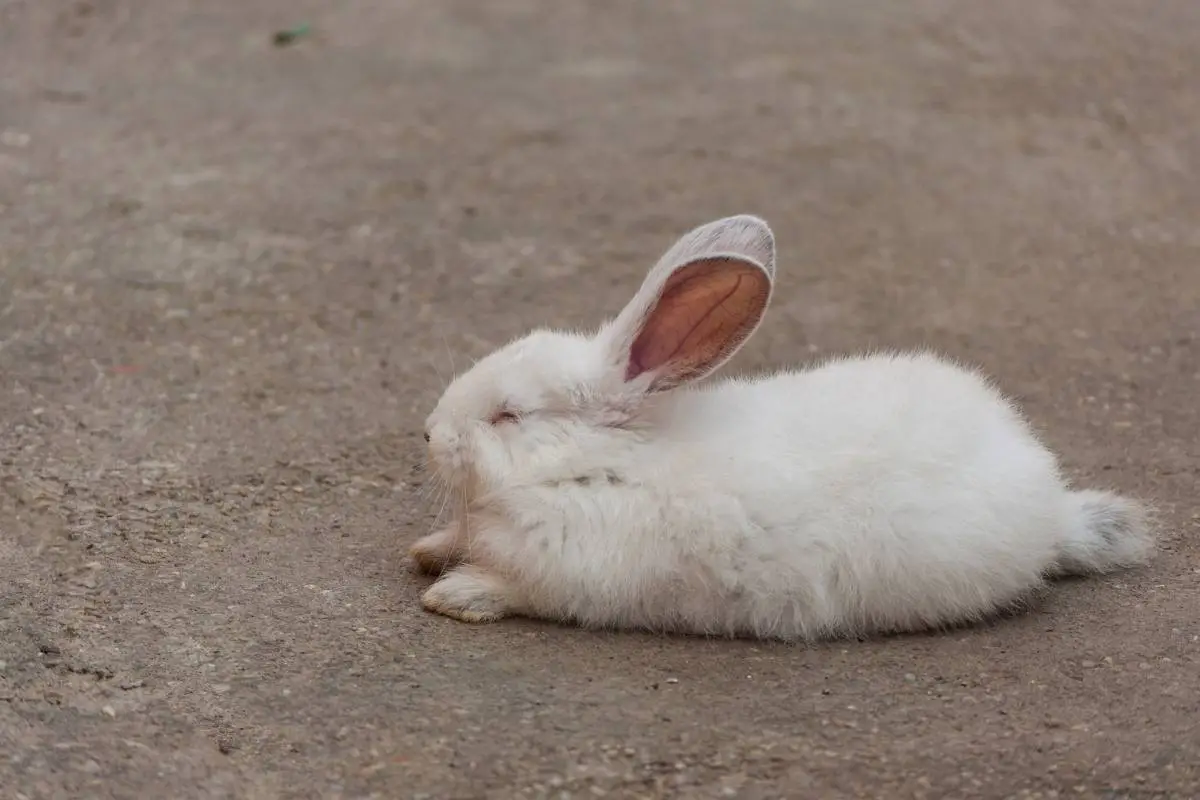Rabbits are not the most demonstrative of pets. They like to be active, but sometimes it’s hard to tell if something is wrong with your rabbit or if they are just behaving normally.
So, why is my rabbit sleeping more than usual? It could simply be that your rabbit feels safe enough to sleep more soundly than usual. However, there may be cases when a rabbit is lethargic because of illness.
In this article, we’ll first look at what normal sleep looks like for a rabbit, then, we’ll dive into a couple examples of what could be wrong. In particular, if you’re rabbit is sleeping a lot and not eating, this is cause for concern. But first, let’s discuss what the likely answer is.
Normal Hours of Activity
You may be familiar with the terms nocturnal and diurnal, which, in relation to animals, means that an animal is active either at night (nocturnal) or during the day (diurnal). Rabbits are neither of these, but rather are called crepuscular, which means they are active during the dusk and dawn hours.
Your rabbit knows instinctively that it is pretty much at the bottom of the food chain, so, operating on thousands of years of adapted instinct, your rabbit wants to be active either when the sun is beginning to light the sky or during the twilight hours after it has gone down.
In other words, Rabbits are safest during the times when neither diurnal nor nocturnal animals can see well. Likewise, this means that your rabbit is instinctively going to want to sleep during broad daylight and night time when its predators are out and about.
Normal Sleeping Habits

Your rabbit may seem to you to have strange sleeping habits, but these habits may actually be normal and, more importantly, they may have to do with the increasing trust your rabbit has with you and the environment you’ve placed it in. So, your rabbit may appear to you to be sleeping more than usual because it trusts you enough to let its guard down.
Let’s find out what this means by discussing what normal sleep looks like for a rabbit.
Eyes Open
As we have already discussed, rabbits have an instinct for self-preservation. In the case of sleep, Rabbits often sleep with their eyes open.
Rabbit eyes have a third eyelid that covers the eyeball keeping it moist, but allowing the rabbit to discern changes in light and shadow. You can probably guess that this helps the rabbit determine whether or not predators are approaching. Being able to sleep while also being able to visually sense danger is a safety instinct that gives the rabbit a defensive advantage if a predator is stalking it.
But as rabbits come to trust their owners and their environment, it’s more likely that they will sleep with their eyes closed. This may also be accompanied by an increasingly relaxed change of position. These positions of sleep can actually tell you a lot about how your rabbit feels about you.
The Loaf
We’re getting into bunny-speak vocabulary that you are likely to find used on any number of rabbit forums and websites. The Loaf is the first common sleeping position for a rabbit. When your rabbit is in the Loaf, its feet are tucked in underneath its body and its ears are usually laying down flat.
This is the most likely posture for your rabbit to be in when it is sleeping with its eyes open. You can probably guess why. All four feet are placed securely underneath it so if your rabbit senses approaching danger, it can literally spring away as quickly as possible.
The Sprawl
Now we start to see positions where your rabbit begins to express trust in its environment. In the Sprawl, your rabbit lays on its abdomen with its feet stretched out in front and behind. It is more likely that your rabbit will sleep with its eyes closed in this position as your rabbit has already comprised the ability to get a running start as quickly as possible.
A rabbit that sprawls next to you is the bunny equivalent of a dog that curls up on your lap. Your rabbit is saying I trust you enough to let my guard down.
The Flop
Finally, we have the Flop. This position is the highest expression of trust coming from a rabbit. It means that its bunny brain doesn’t have a care in the world. It also can be startling for new rabbit owners, because, in this position, your bunny is so relaxed, it can look like it’s dead (especially if the eyes are still open).
The name is a pretty good description for the act. Your rabbit flops itself down on its side and goes right to sleep without preamble. In this position your rabbit is experiencing deep sleep. Combined with your rabbit’s normal sleeping hours, your rabbit may seem to be sleeping more than usual if your rabbit trusts you enough to do the Flop.
Sleep Movement
Here’s a couple more comments about your rabbit’s sleep. Your rabbit may express both atonic state and myoclonic movements during sleep. What on earth does that mean? An atonic state is when your rabbit is so relaxed that the body of your rabbit feels loose, almost fluid. You might find this scary, but it is normal, and it accompanies the Flop.
Myoclonic movements are also normal and part of what we would call a dream sleep. They include muscle twitching and rapid eye movement. Your rabbit might just be dreaming of the Bunny 500.
When Lethargy Is a Problem

Sometimes lethargy can be a sign of a problem, so here are some things to watch out for.
Ileus
Ileus can also be referred to as GI stasis or gut stasis. It is a condition where the normal movement of the intestines (which is referred to as peristalsis) slows down dramatically or comes to a stop. There can be many underlying causes of this condition:
- Dental problems
- Dehydration
- Poor diet
- Blockage
- Bloat (gas that is trapped in the intestines)
- Parasites
- Urinary tract infection
There are other possible causes that your vet may diagnose. The primary symptom of this is refusal to eat and the inability to produce fecal matter. Lethargy may accompany this problem, but is not, in and of itself, the primary symptom.
In an article put out by the University of Miami, doctors warn that “if your rabbit stops eating or producing feces for 12 hours or more, you should consider the condition an emergency.” Take your rabbit to your vet right away. Dogs or cats may be able to skip a meal, but rabbits don’t do well with that.
Dehydration

If your rabbit is lethargic, it may be a sign of dehydration. If your rabbit spends a lot of time out of doors in the summer, you should watch for this. But once again, lethargy is not the only sign. Other symptoms include:
- Panting
- Salivating
- Convulsing
- Weakness
- Red ears
Fortunately, there are very simple ways to protect against dehydration. You can keep ice in a container like a bowl or a frozen water bottle where your rabbit has access to these things. Make sure their pen is in a shaded area and relocate it if you have to.
You can also mist water on your rabbit’s ears with a spray bottle (ears are how a rabbit regulates body temperature) or place a wet towel over their pen.
Do a Quick Health-Check
If you’re concerned about your rabbit’s behavior, you can always do a quick health check by looking for symptoms that are commonly associated with illness in rabbits. You should consider consulting your vet if your rabbit is:
- Grinding teeth loudly
- Breathing hard or sneezing
- Drooling
- Unable to balance
- Having diarrhea
- Refusing to eat
These symptoms point to anything from tooth problems to inner ear or respiratory infections, and your rabbit savvy vet is the best person to consult.
Conclusion
In conclusion, remember that your rabbit’s instinct is to protect itself. Normal sleep for your rabbit may look like not sleeping at all. Your rabbit may sleep crouched on all fours with eyes wide open. Also remember that your rabbit is naturally going to want to sleep during the day.
It’s important to keep this in mind because as your rabbit gets used to you and the environment you’ve placed it in, your rabbit may appear to be sleeping more than usual because of its increased level of trust. If your rabbit Flops on the ground and falls into an atonic state of slumber, it’s a deep expression of trust. Your rabbit is content.
However, to be on the safe side, keep some basic symptoms in mind that may be associated with lethargy. Especially if your rabbit is refusing to eat and not able to produce feces, you should call your vet right away for a consultation.

